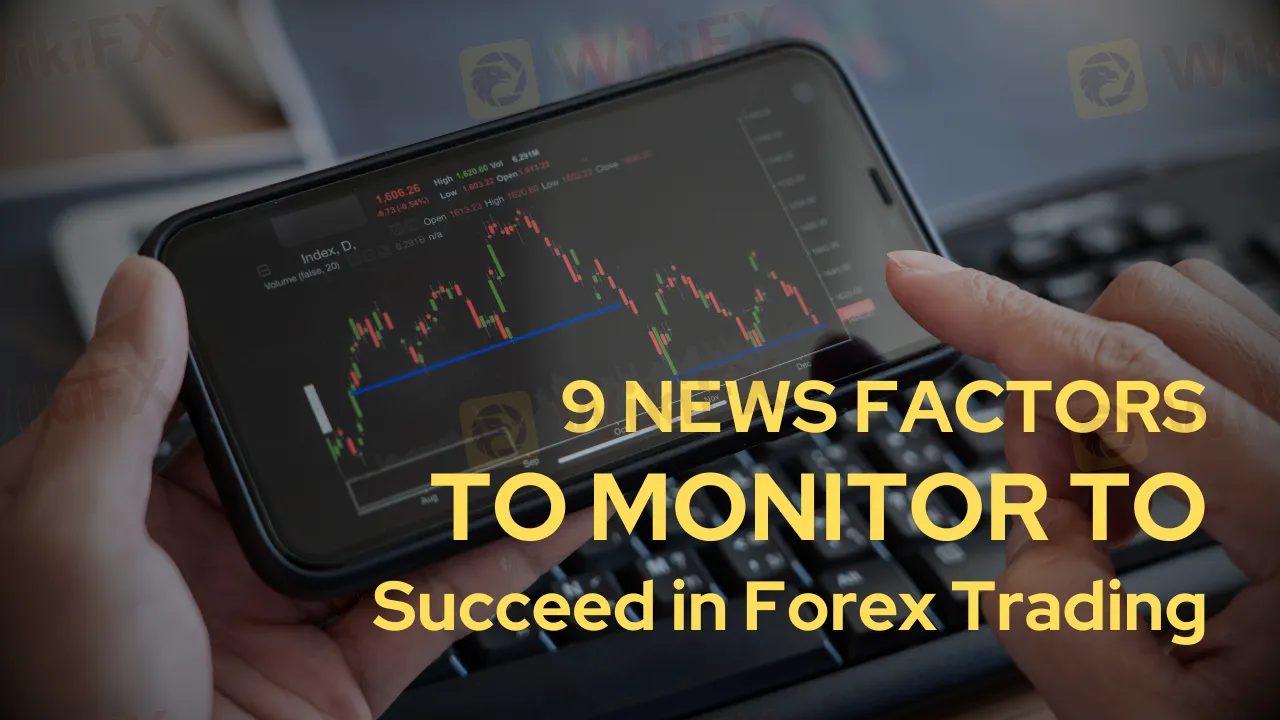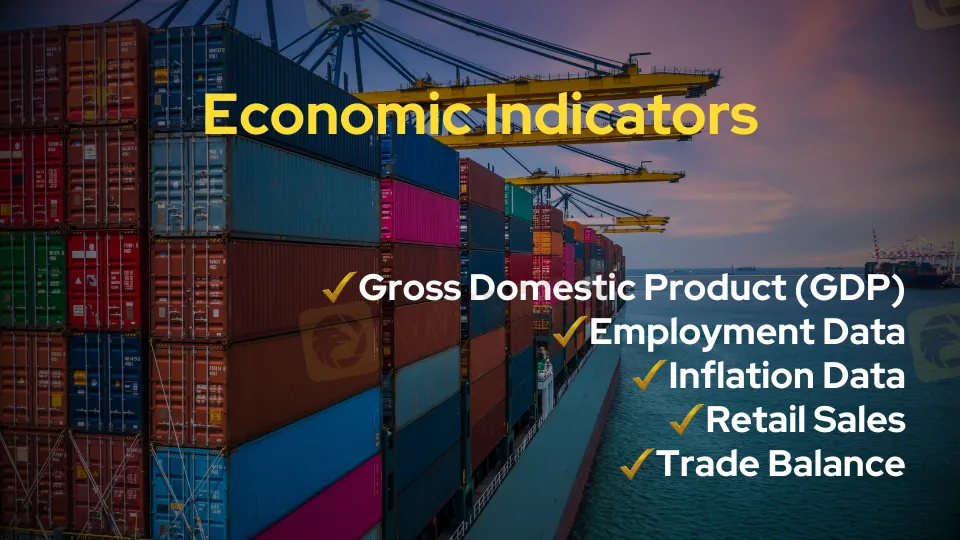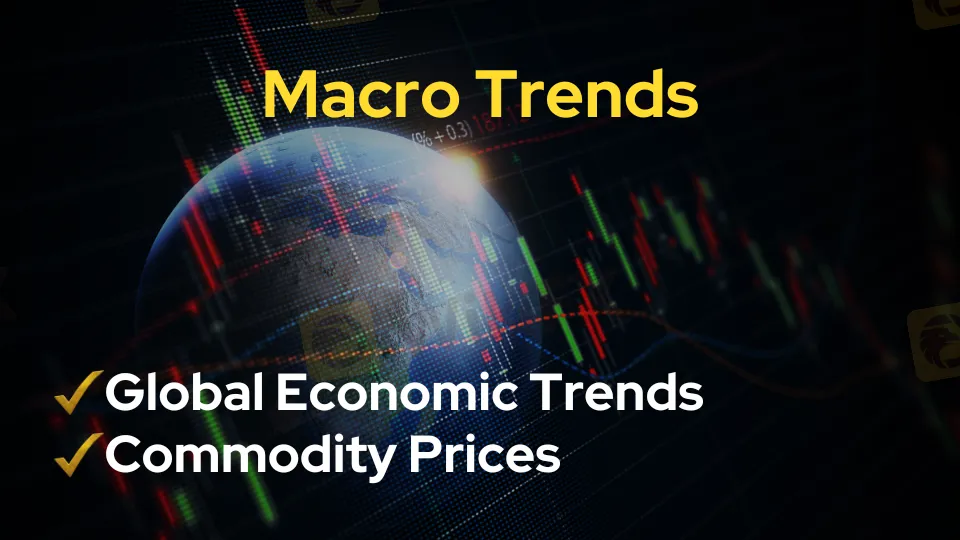简体中文
繁體中文
English
Pусский
日本語
ภาษาไทย
Tiếng Việt
Bahasa Indonesia
Español
हिन्दी
Filippiiniläinen
Français
Deutsch
Português
Türkçe
한국어
العربية
9 News Factors to Monitor to Succeed in Forex Trading
Abstract:Discover the top 9 news factors that every Forex trader must monitor for success. Our guide for beginners breaks down economic indicators, monetary policy, and global events that impact Forex trading.

Embarking on a journey into the world of Forex trading is akin to setting sail on the vast and often turbulent financial oceans. For beginners, understanding the currents and winds—in the form of economic news and events—is essential to navigate these waters successfully. Here, we elaborate on the nine crucial news factors that can help beginners chart a course to Forex trading success.
Economic Indicators: The Beacons of Economic Health
Economic indicators are the beacons that signal the health and direction of a country's economy. Like a captain uses lights to avoid rocky shores, traders use these indicators to make informed decisions.

Gross Domestic Product (GDP)
The GDP represents the total dollar value of all goods and services produced over a specific time period. It is the most comprehensive economic measurement of a nation‘s total output and is a key indicator to gauge the economy’s strength. A rising GDP is often accompanied by expectations of higher interest rates, which can attract investors to a currency.
Employment Data
Employment figures, especially in influential economies like the United States with its non-farm payrolls, serve as a health check for the labor market. Strong job growth indicates a robust economy, which can lead to increased consumer spending and potentially higher interest rates—both positive signs for a currency.
Inflation Data
Inflation measures how much more expensive a set of goods and services has become over a certain period, often a year. Central banks closely watch inflation; if its too high, they may raise interest rates to cool the economy; too low, and they might cut rates to spur spending. Both actions can cause swings in currency values.
Retail Sales
This indicator tracks consumer spending, which contributes to the majority of overall economic activity. Consistently rising retail sales may encourage a country's central bank to increase interest rates due to an expanding economy, potentially leading to currency appreciation.
Trade Balance
A country's trade balance reflects the difference between exports and imports. A trade surplus indicates that a country is exporting more than it is importing, increasing demand for its currency. Conversely, a trade deficit can weaken a currency as more of it is sold to buy foreign goods.
Monetary Policy: Steering the Economic Ship
Monetary policy refers to the actions undertaken by a nation's central bank to control the money supply and achieve economic goals like controlling inflation, contributing to employment, and maintaining financial stability. These decisions can create waves in Forex markets.

Interest Rate Decisions
Interest rates are the main lever that central banks use to shape monetary policy. High interest rates offer lenders in an economy a higher return relative to other countries. Therefore, higher rates attract foreign capital and cause appreciation of the currency.
Central Bank Minutes and Speeches
Minutes from central bank meetings and speeches by key bank officials can be packed with insights into the bank's view on the economy. This, in turn, provides traders with clues about future interest rate decisions.
Political Events: Navigating Through Uncertainty
The political landscape can have an immediate and sometimes volatile effect on a countrys currency. Political stability is a key preference for investors, and uncertainty can cause market volatility.

Elections
Elections can herald shifts in a countrys economic policy. Markets tend to favor the predictability of incumbents over the uncertainty of newcomers. Significant shifts in governing parties or policies can lead to large swings in currency values.
Geopolitical Tensions
Conflicts, wars, and sanctions can undermine investor confidence and lead to increased volatility. Traders often look for 'safe havens' during such times, leading to strength in currencies like the U.S. dollar or Swiss franc.
Legislation and Regulations
New laws and regulations can impact economic sectors, trade relationships, and ultimately currency strength. For example, a new trade tariff can impact a countrys exports or imports, affecting the trade balance and currency value.
Financial Markets: The Interconnected Web of Influence
Stock and bond markets provide a snapshot of a countrys economic outlook and investor sentiment. These markets often move in tandem with the Forex market and can serve as a leading indicator for currency movements.

Stock Market Performance
When a country's stock market performs well, it suggests an economically robust and growing environment. This can translate into a stronger currency as more foreign investors exchange their money into the local currency to purchase stocks.
Bond Yields
Bond yields, particularly government bond yields, are a reflection of the country's interest rates and are watched by Forex traders. Higher bond yields can attract foreign investors seeking better returns, which can increase demand for a countrys currency.
Economic Reports and Indicators: The Windsocks of Economic Activity
These reports are often released monthly and can cause significant volatility in the Forex market.

Purchasing Managers Index (PMI)
The PMI is an indicator of economic health for manufacturing and service sectors. A PMI reading above 50 represents expansion; below indicates contraction. Traders watch these figures closely as they can be a leading indicator of overall economic performance.
Consumer Confidence and Sentiment Indicators
These surveys gauge the mood of consumers regarding economic conditions. High consumer confidence can lead to increased spending, which can drive up demand for a currency.
Global Events: Catalysts for Sudden Storms
Global events can cause sharp and sudden turns in Forex markets.

Economic Summits and Forums
Meetings such as the G7 and G20 can result in multinational agreements that impact the Forex market. Decisions on trade agreements, economic cooperation, and financial aid can all affect currency values.
Disasters and Emergencies
Natural disasters, pandemics, and other emergencies can disrupt economic activity and create uncertainty. The immediate impact can be unpredictable, but typically, a nations currency will weaken if the event has a significant negative impact on its economy.
Market Sentiment: The Tides of Traders Thoughts
Market sentiment can be bullish or bearish, and it can be a powerful force.

Market Analysts' Commentary
Expert commentary can sway market sentiment. When well-known analysts express opinions, traders listen, and markets can move.
Technical Analysis Patterns
While technical analysis isnt a news factor, the patterns and indicators used can signal market sentiment. For example, a head and shoulders pattern might indicate a reversal of an uptrend and could influence how traders position themselves in the market.
Macro Trends: The Climate of the Financial World
Long-term global economic trends can set the stage for movements in the Forex market.

Global Economic Trends
Forecasts by international organizations such as the IMF or World Bank can influence investor expectations globally, affecting currency strength or weakness.
Commodity Prices
For countries that are major producers of commodities (like Canada and oil or Australia and iron ore), the prices of these commodities can directly affect the strength of their currency.
Currency-Specific News: Spotlight on Singularities
Sometimes a currency is moved by events that are unique to its country.

Emerging Market Developments
Emerging markets can be volatile. Economic developments in these regions can lead to significant currency movements as investors search for yield or move to safe havens.
Bank Interventions
Central banks sometimes intervene directly in the Forex market to stabilize or devalue their currency, often to improve competitiveness or to combat extreme market movements.
Bottom Line
For novices in the Forex realm, knowledge of these nine news factors is the compass by which to navigate. These factors signal opportune moments for trading decisions, helping to manage risks and exploit prospects for profit. Continual learning, practical experience, and attention to these aspects of the Forex environment are essential for achieving a successful trading strategy.
The currency market is dynamic, and influenced by a multitude of factors ranging from macroeconomic trends to political climates. Mastery of these elements allows traders to anticipate movements and react accordingly. While theres no guaranteed route to success in Forex trading, a well-informed and strategic approach, augmented by a keen understanding of these key news factors, is certainly a sound voyage plan for any trader aiming to conquer the Forex seas.

Disclaimer:
The views in this article only represent the author's personal views, and do not constitute investment advice on this platform. This platform does not guarantee the accuracy, completeness and timeliness of the information in the article, and will not be liable for any loss caused by the use of or reliance on the information in the article.
Read more

Exposed: Deceptive World of Fake Trading Gurus – Don’t Get Fooled!
The internet is inundated with advertisements and promotions from self-proclaimed trading gurus who promise to teach you how to become a successful trader and earn a substantial secondary income. These individuals often claim that their trading techniques can make you rich, even if you have zero experience. However, these assertions are typically false, and many people fall victim to these scams. This article aims to expose these fake trading gurus, explain how they operate, and provide tips on how to avoid being scammed.

Why More People Are Trading Online Today?
Discover why online trading is booming with tech, AI, and a push for financial freedom. From stocks to crypto, it’s a thrilling hustle for all.

SEC Ends Crypto.com Probe, No Action Taken by Regulator
The SEC has closed its investigation into Crypto.com with no action taken. Crypto.com celebrates regulatory clarity and renewed momentum for the crypto industry.

Bitpanda Secures Full Broker-Dealer License in Dubai
Bitpanda has officially obtained a full broker-dealer license from the Dubai Virtual Assets Regulatory Authority (VARA), marking a significant milestone in its international expansion. This approval, which follows preliminary authorization granted three months earlier, enables the European digital asset exchange to introduce its comprehensive suite of virtual asset services to investors in the United Arab Emirates (UAE).
WikiFX Broker
Latest News
Fidelity Investments Explores Stablecoin Innovation in Digital Assets Sector
Interactive Brokers Expands Crypto Trading with Solana, XRP, Cardano, and Dogecoin
SEC Ends Crypto.com Probe, No Action Taken by Regulator
Why More People Are Trading Online Today?
How Crypto Trading Transforms FX and CFD Brokerage Industry
UK would not hesitate to retaliate against US tariffs - No 10 sources
Gold Surges to New Highs – Is It Time to Buy?
Bitpanda Secures Full Broker-Dealer License in Dubai
Lost Money to Scam Recently?! This Article Could Help You!
Navigating the Intersection of Forex Markets, AI Technology, and Fintech
Currency Calculator







